Most of your daily purchases qualify as everyday expenses. They’re unremarkable and non-impulsive, and you make them without a second thought. They happen at places like the supermarket, gas station, drugstore, quick-service restaurant, and parking meter.
You also make larger purchases that require more planning and forethought, such as travel reservations, date nights, or supplies for various home improvement projects. But a purchase picked from your credit card statement at random is likelier than not to meet the definition of “everyday.”
For these everyday purchases, you can be rewarded for your spending by using the right cash-back credit cards or travel rewards credit cards. Such cards earn cash back or travel rewards at flat, predictable rates, with no strings attached and no confusing categories or tiers to keep track of.
Best Credit Cards to Use for Everyday Spending
These are the best credit cards to use for everyday purchases — whatever “everyday” means to you. As long as you use these cards wisely, you can turn your commonplace purchases into extra cash, travel, or merchandise.
Best for Frequent Travelers: Capital One Venture Rewards Credit Card

The Capital One Venture Rewards Credit Card is one of the most popular travel credit cards on the market. With an early spend bonus worth hundreds at redemption and unlimited 2 miles per $1 spent on most eligible purchases, it’s no wonder. Venture Rewards is the best everyday spending card for frequent travelers.
And unlike most premium travel rewards credit cards, it earns an attractive rate of return on all spending — not just favored traveler-friendly categories like airfare and hotel purchases. This makes Venture one of the best rewards cards all around.
- Early Spend Bonus: Earn 75,000 bonus miles after you spend $4,000 on the card within 3 months from account opening. That's worth $750 in travel expenses at redemption.
- Earn Up to 5x Miles: Hotel and car rental purchases made through Capital One Travel earn 5 miles per $1 spent.
- Earn 2x Miles: Most other eligible purchases earn unlimited 2 miles per $1 spent with no caps or restrictions.
- Redeem for Statement Credits or Travel: Redeem for statement credits against prior travel purchases or direct travel bookings made through Capital One’s online travel portal.
- Transfer Points to Travel Partners: Transfer your accumulated miles to any of Capital One’s 15+ travel partners.
- $95 annual fee
- No foreign transaction fee
- Get a statement credit up to $100 against Global Entry or TSA PreCheck
Learn More About the Capital One Venture Rewards Credit Card
Best Introductory Offer: Chase Freedom Unlimited Credit Card
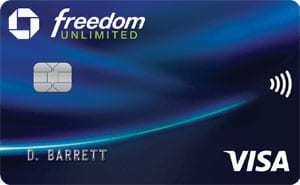
Following the end of the first-year promotional period, Chase Freedom Unlimited Credit Card earns unlimited 1.5% cash back on most eligible purchases, with no caps or restrictions on earning potential.
There are two exceptions worth noting:
- Unlimited 5% cash back on eligible purchases made through Chase Travel.
- Unlimited 3% cash back on eligible drugstore and restaurant purchases (including takeout and eligible delivery).
But the real headline here is a generous sign-up bonus during the first year your account is open.
Earn an additional 1.5% cash back on everything you buy (on up to $20,000 spent in the first year) - worth up to $300 cash back!Additional features:
- Redeem for Cash Back and More: Redeem in any amount for statement credits, bank account deposits, mailed checks, credits against purchases with Amazon and other merchant partners, gift cards, travel, general merchandise, and more.
- Transfer Points to Travel Partners: If you have a premium Chase Travel℠ card (Chase Sapphire Reserve or Chase Sapphire Preferred) or a premium Chase business card (like Chase Ink Business Cash or Chase Ink Business Preferred®), you can transfer loyalty currency earned with your Freedom Unlimited card to any of about a dozen travel loyalty partners at a 1-to-1 ratio.
- 0% APR Introductory Offer: Pay no interest (0% APR) on purchases and balance transfers for 15 months from your account opening date. Thereafter, regular APR applies — currently 20.49% - 29.24% variable, depending on your creditworthiness and other factors.
- No annual fee
- Foreign-denominated transactions cost 3% of the total transaction amount
Learn More About the Chase Freedom Unlimited Credit Card
Best for Comparison Shopping: Capital One Quicksilver Cash Rewards Credit Card
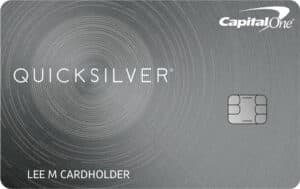
The Capital One Quicksilver Cash Rewards Credit Card bears more than a passing resemblance to the Chase Freedom Unlimited Credit Card. But that’s not why it’s on this list.
No, Quicksilver shows up here because it’s the only flat-rate cash-back credit card with built-in comparison shopping and price protection engines. These are Capital One Shopping — basically, a multimerchant price scanner in the palm of your hand — and Paribus, which makes it easy to find which merchants owe you a refund.
Use them well.
Additional features:
- $200 Early Spend Bonus: Earn a $200 bonus when you spend at least $500 on eligible purchases within the first 3 months of opening your account.
- Unlimited 1.5% Cash Back: Earn unlimited 1.5% cash back on most eligible purchases made with your card.
- Unlimited 5% Cash Back on Eligible Capital One Travel Purchases. Eligible hotel and car rental bookings earn unlimited 5% cash back when made through Capital One Travel.
- Redeem for Cash and More: You can redeem in any amount for statement credits, gift cards, or paper checks. You can also schedule automatic redemptions at the following thresholds: $25, $50, $100, or $200.
- 0% APR Introductory Offer: Pay no interest (0% APR) on purchases and balance transfers for 15 months from account opening, then variable APR applies, currently 19.99% to 29.99%.
- No annual fee
- No foreign transaction fee
Apply Now for the Capital One Quicksilver Cash Rewards Card
Best For Earning Cash Back: Citi Double Cash Card
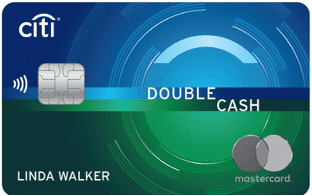
For those who have no trouble paying their statement balances in full each month, the Citi Double Cash Card is one of the best everyday spending credit card on this list. It also happens to be one of the best cash-back credit cards around.
That’s due to an unusually generous rewards program that promises a 2% return on all card charges paid in full by the statement due date, and a redemption menu with few strings other than a $25 minimum redemption threshold.
- Sign-up Bonus: None
- Earn Rewards When You Spend: Earn 1% cash back at the time of purchase on all eligible purchases made with your card.
- Earn Rewards When You Pay Your Bill: Earn another 1% cash back on payments against your statement balance, provided you pay at least the required minimum payment each month. If you pay your balance in full each month, you’ll earn a 2% rate of return on spending.
- Redeem for Cash Back and More: Redeem your accumulated cash-back rewards for statement credits, gift cards, bank deposits, and paper checks.
- 0% APR Offer: Pay no interest (0% APR) on balance transfers for 18 months from account opening. Variable regular APR applies after that (currently 18.99% to 28.99%).
- Foreign Transaction Fee: Foreign-denominated transactions cost 3% of the transaction amount.
- Other Perks: The complimentary Citi Entertainment feature promises preferred access to exclusive presales, tickets to sold-out shows, and VIP experiences at thousands of venues each year.
Apply Now for the Citi Double Cash Card
Best for Automotive Spending: My GM Rewards Card™
Earn Unlimited 7x Total Points With GM and 4x Points on Purchases Everywhere Else
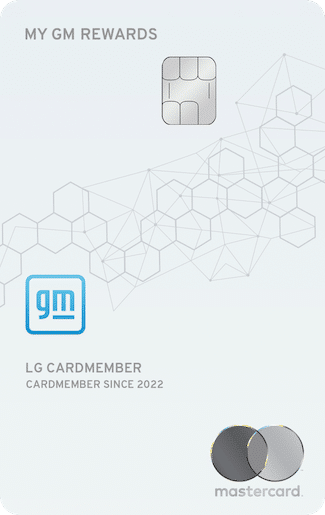
The My GM Rewards Card™ is a great everyday spending credit card for General Motors owners — and anyone planning to purchase a GM vehicle in the near future.
Customize your cardmember experience by choosing from one of five card designs: GM, Chevrolet, Buick, GMC, or Cadillac. Then gear up to earn unlimited 7x total points with GM purchases and 4x points on all other eligible purchases.
Here’s what else you need to know about this card.
- Welcome Offer: Get 15,000 bonus points after you spend $1,000 in your first 3 months.
- Earn Rate. Earn 4x points for every $1 spent everywhere, and receive unlimited 7x total points for every $1 spent with GM. Points don’t expire as long as your account remains open.
- Introductory APR: Enjoy 0% intro APR on purchases for the first 12 months, then a variable APR of 19.99% to 29.99%. Rates as of June 1, 2023.
- Key Fees: No annual fee, no foreign transaction fees, or cash advance fees. Late fees may apply.
- Other Perks: See if you’re approved with no impact to your Credit Score. Accepting a card after your application is approved will result in a hard inquiry, which may impact your credit score.
Terms & Limitations Apply.
Click here to see Rates and Terms and Benefit Terms.
Select ‘Apply Now’ to learn more about the product features, terms, conditions and Program Rules. Subject to credit approval.
Best for Drivers: U.S. Bank Altitude® Connect Visa Signature® Card

This offer is no longer available.
The U.S. Bank Altitude® Connect Visa Signature® Card is the best everyday spending card for people who drive. That’s because it earns 4x points per $1 spent on eligible gas station, EV charging station, and car rental purchases. (See rates & fees.)
Whether you’re commuting, running errands, driving the kids around, driving for word, road tripping, or all of the above — that kickback won’t go to waste.
Additional features:
- 4x Travel Categories: Earn 4x points on eligible travel purchases, including airfare, hotels, and car rentals.
- 2x Rewards Categories: Earn 2x points on streaming, restaurant dining, and grocery store and grocery delivery purchases.
- Base Rewards: Earn 1x point on all other eligible purchases.
- Earn 50,000 Bonus Points As a Sign-up Bonus: Spend $2,000 in eligible purchases within the first 120 days of account opening to earn 50,000 bonus points.
- $95 annual fee after the first year
- No foreign transaction fee
- Get up to $30 in annual statement credits for eligible streaming services, including Netflix and Spotify®
- Get up to $100 to offset your TSA PreCheck® or Global Entry® application fee
Terms and conditions apply; see rates & fees.
Best for Grocery Shopping: Blue Cash Preferred® Card from American Express
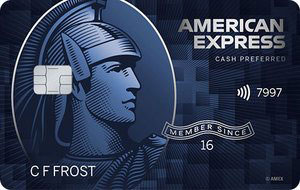
The Blue Cash Preferred Card from American Express is the best cash-back card for people with sizable grocery bills.
It earns 6% cash back on all U.S. supermarket transactions, up to a $6,000 annual spending limit. Above the limit, U.S. supermarket purchases earn 1% back, with no upper limit.
Cash back accrues as Reward Dollars that can be redeemed for statement credits or at Amazon.com checkout. Terms apply.
Bear in mind that superstores like Walmart and wholesale clubs like Costco are not included in this card’s supermarkets category. Additionally, a $95 annual fee applies after the first year. See the rates and fees page for more details.
Additional features:
- Welcome Offer: Earn $250 back after you spend at least $3,000 on purchases within the first 6 months. Cash back accrues as Reward Dollars that can be redeemed for statement credits.
- Additional 6% Cash-Back Categories: Earn 6% cash back on eligible purchases with digital media and streaming providers such as Netflix and HBO. Terms apply.
- 3% Cash-Back Categories: Earn 3% cash back on purchases at U.S. gas stations and transit operators, including ridesharing platforms like Uber and Lyft. Terms apply.
- Base Rewards: Earn 1% cash back on other eligible purchases, with no limits. Terms apply.
- Redemption: Redeem Reward Dollars for statement credits or at Amazon.com checkout. Terms apply.
- 0% APR Introductory Offer: Enjoy 0% APR on purchases and balance transfers for 12 months. Following the end of the introductory period, the regular APR is variable (currently 19.24% to 29.99%), depending on prevailing rates and your personal creditworthiness. See this card’s rates and fees page.
- The annual fee is $0 in the first year, then $95 each year thereafter
- 2.7% foreign transaction fee
- See rates and fees
Learn More About the Blue Cash Preferred Card
Methodology: How We Select the Best Credit Cards for Everyday Spending
We use several important factors to evaluate everyday spending credit cards. Each relates in some way to these cards’ overall value — how their costs compare to their rewards, perks, flexibility, and ease of use.
Rewards Categories
How does your everyday spending card reward you, exactly? That depends on its rewards categories.
The best everyday spending cards in our book have either flat-rate rewards programs or tiered rewards schemes that focus on common spending categories like supermarkets and transportation. We don’t like cards with narrow rewards categories, nor those with lower rewards rates in general.
New Cardmember Offers
The best everyday spending credit cards try to entice applicants with promises of sign-up bonuses, 0% APR introductory promotions, or both. All else being equal, we prefer cards that do both — or at least one or the other.
Annual Fees
No one loves paying credit card annual fees, and we believe credit cards that hold themselves out as “everyday” spending aids shouldn’t charge them.
On the other hand, when the rewards or perks are generous enough and cardholders can take full advantage, annual fee cards pay for themselves. That’s why this list includes some, though we always give first preference to annual-fee-free cards.
Other Card Fees
Foreign transaction fees. Late payment fees. Authorized user fees.
These are pesky charges that can really add up. We don’t like them, and neither should you. All else being equal, we look for everyday spending cards that minimize them.
Credit Card Perks and Benefits
Most of the credit cards on this list come with comprehensive slates of perks backed by Visa, Mastercard, or American Express. Some perks are complimentary, while others incur out-of-pocket costs if you use them. All add value in some way.
A few of these cards go even further and offer perks for specific types of users, such as frequent travelers. If you’re able to take advantage of special discounts with partner travel merchants, for example, you’ll come out well ahead.
So, all else being equal, we’re big fans of everyday spending cards that go the extra mile on the perks and benefits front.
FAQs About Everyday Credit Cards
You have questions about credit cards for everyday spending. We have answers.
What Is an Everyday Spending Credit Card?
It depends on your definition of “everyday spending.”
For example, if your “everyday” expenses are likely to involve a trip to the supermarket, gas pump, or drugstore, you’d be well-served by a credit card that favors those sorts of purchases.
That might mean picking a travel card that earns extra on supermarket or gas purchases while also racking up points on airfare, hotel stays, and car rentals. Or it might mean choosing a low-key cash-back card that offers really impressive returns in those specific spending categories and more modest rewards in others.
Are Credit Card Annual Fees Worth It for Everyday Spending?
It depends how heavily you spend. Generally, the more you spend on your credit card, the more rewards you’ll earn. And more rewards means more value to offset the annual fee.
So if you can consistently spend heavily enough to comfortably outstrip a particularly generous credit card’s annual fee, choose that card and you’ll come out ahead. But if you’re not sure you can sustain a high level of spending, or you expect your spending patterns to change over time, a no-annual-fee card with unlimited rewards potential might be a safer pick.
What Are the Most Common Credit Card Purchases?
Credit card spending is a reflection of consumer spending in general. That means the sorts of purchases basically everyone needs to make are among the most common credit card purchases.
Think groceries, household staples like toilet paper, over-the-counter medications, utilities, transportation fares and fuel — the list goes on and on. Not all of these qualify as “everyday” — utilities typically bill by the month — but they’re nigh unavoidable.
How Many Credit Cards Should You Have?
The average American adult has about two credit cards. But that’s just an average.
Millions of consumers have no credit card at all because they have bad credit or prefer to avoid credit cards altogether. Millions more have more credit cards than can fit in their wallet.
There’s no clear answer to the question, how many credit cards should I have? One thing is for sure, though: If you’re struggling to keep track of your credit card bills or giving into the temptation to spend more than you own, it could be time to scale back.
Just don’t close all your accounts at once. That could negatively affect your credit score. Instead, pay off any outstanding balances and keep the cards you don’t need in a locked drawer or somewhere else where you won’t be tempted to use them. Retain one or two everyday spending cards in your wallet — whatever you need to get through the month.
How to Select the Best Credit Card for Everyday Purchases
To select the best credit card for everyday spending, think about what “everyday spending” means to you.
Your day-to-day (or week-to-week) probably involves trips to the grocery store and perhaps to the gas station or EV charging station. But surely food and fuel aren’t the only things you spend your money on. What else is there?
If your everyday spending is varied enough, consider a flat-rate cash-back or travel rewards card that earns the same solid rate of return on all eligible purchases. That way, you don’t have to think much about how or where you’re spending your money. You’ll just quietly and consistently rack up the rewards.
Your main alternative is a tiered rewards card that earns very good returns on spending in specific categories, such as supermarkets and drugstores. If you tend to lump your purchases in a few broad categories, this could be the direction to go.
One thing’s for sure: You won’t go wrong with any of the cards on this list.
For rates and fees of the Blue Cash Preferred® Card from American Express, please visit this rates and fees page.